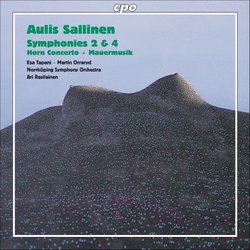| All Artists: Aulis Sallinen, Norrköping Symphony Orchestra Title: Aulis Sallinen: Symphonies 2 & 4; Horn Concerto; Mauermusik Members Wishing: 1 Total Copies: 0 Label: Cpo Records Original Release Date: 1/1/2006 Re-Release Date: 2/21/2006 Genre: Classical Styles: Forms & Genres, Concertos, Historical Periods, Modern, 20th, & 21st Century, Symphonies Number of Discs: 1 SwapaCD Credits: 1 UPC: 761203996926 |
Search - Aulis Sallinen, Norrköping Symphony Orchestra :: Aulis Sallinen: Symphonies 2 & 4; Horn Concerto; Mauermusik
 | Aulis Sallinen, Norrköping Symphony Orchestra Aulis Sallinen: Symphonies 2 & 4; Horn Concerto; Mauermusik Genre: Classical
|
Larger Image |
CD Details |
CD ReviewsA Continuation of This Important Sallinen Series on cpo J Scott Morrison | Middlebury VT, USA | 03/10/2006 (5 out of 5 stars) "I have been very pleased -- perhaps more so than my estimable fellow reviewer, Edward Wright -- with all the preceding issues in this series that appears bound to give us all of Aulis Sallinen's orchestral output. I consider Sallinen to be an unjustly neglected major Finnish composer, certainly one of the finest since Sibelius. Here we have two of Sallinen's symphonies, Nos. 2 and 4, as well as two other pieces, the Horn Concerto and Mauermusik. The two symphonies have been recorded before and I must say that aside from the newer and cleaner sound of the present recording, there is little to choose between these and the older ones on BIS. One thing that might tip the balance in favor of the present issue is that the contrapuntal lines are more clearly heard in this recording, and also bell-sound and tuned percussion -- major features in Sallinen's work -- are truer here. Ari Rasilainen, whose work has impressed me in recordings of other composers, is clearly a devotee of Sallinen's music and presents it with fervor and conviction reflected in the playing of the fine Norrköping (Sweden) Symphony Orchestra. It must be noted that Sallinen participated as an advisor in this series of recordings.
The two symphonies make use of a technique pioneered by Sallinen's great influence, Sibelius, namely that of mosaic construction with tiny, usually easily identifiable melodic cells, that are combined and recombined in a fashion that is, for me, utterly effective. This music is completely tonal but sounds like little before it besides perhaps some of the later Sibelius symphonies. There is a raffish quality that is entirely missing in Sibelius, though, a kind of loose-limbed ease that is ingratiating. I find myself humming little smidgens of these works for days after I've listened to them. And invariably I am mentally smiling as I do so. In the early minutes of the one-movement Second Symphony there is a passage that sounds like the barroom scene in Wozzeck, one of that work's most identifiable moments. Whereas in Wozzeck the passage is ironic, here it sounds boozily congenial. I love it every time it comes around. The excellent featured percussionist is Martin Orraryd. The Fourth Symphony opens with a trudging but ultimately triumphant motto that dominates much of the movement. This motto is later imitated by the dark-toned contrabasses in a way that suggests a menacing undertone to this otherwise seemingly ironic and parodistic work. The use of parody and pastiche links Sallinen to such composers as Shostakovich and Schnittke, but it is always in his own easily identifiable voice. The Horn Concerto did not impress me the first time around. But as I listened to it again and yet again, it suddenly opened up into a lyrically beautiful composition, much the way some Hindemith has been for me. The soloist, Esa Tapani, is excellent. The subtitle for the concerto, 'Compane ed Arie', means 'Bells and Arias' and the former term could mean the horn's bell or ding-dong bells. Both are present in the work. The smaller work, about ten minutes, is 'Mauermusik' ('Wall Music'), written in 1962. It is dedicated to the memory of a young East German who was shot as he tried to escape over the Wall into West Berlin. The music is in Sallinen's earlier expressionist style which is entirely fitting for the subject at hand. I would urge anyone not familiar with Sallinen's work to give this CD a try. Scott Morrison" |

 Track Listings (7) - Disc #1
Track Listings (7) - Disc #1